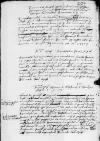Letter #1771
Ioannes DANTISCUS to Fernando de GUEVARALöbau (Lubawa), 1537-11-16
English register: Dantiscus is replying to Guevara’s letter containing a recommendation of Diego Gracián (de Alderete), whom he already knew, as his future son-in-law. Dantiscus states that though the marriage was agreed upon without his consent, there is nothing else he can do but refrain from opposing God’s will. He promises that he will let his daughter’s husband know at the proper time what his view of the situation is.
Manuscript sources:
Auxiliary sources:
Prints:
| ||||||||||
Text & apparatus & commentaryPlain textText & commentaryText & apparatus
Ioannes etc., Dei gratia episcopus Culmensis, administrator Pomesaniensis et ad episcopatum Varmiensem postulatus, Egregio Domino doctori Gueuarre salutem plurimam dicit.
Quod nobis eruditum
Ex

 BCz, 244, p. 293
BCz, 244, p. 293